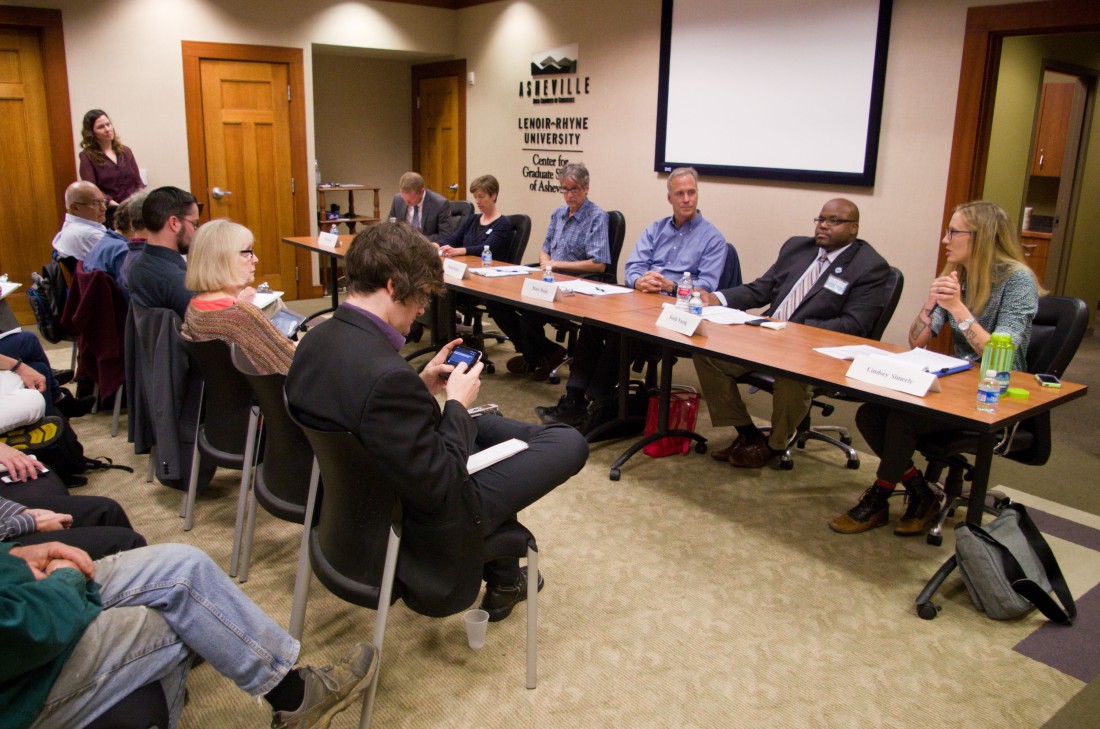At an Oct. 12 forum hosted by the Asheville Buncombe Food Policy Council, the six candidates vying for three City Council seats responded to four long-form questions they’d been given in advance (see box).
The FPC, a volunteer organization, is charged with holding the city accountable to the commitments made in the Food Action Plan. Developed by the FBC and adopted by City Council in January 2013, the document commits Asheville to specific measures to relieve hunger, particularly in food-insecure areas. A 2013 report from the Food Research and Action Center, a Washington, D.C.-based nonprofit, ranked the Asheville metro area ninth-worst in the nation for food insecurity, with more than 1 in 5 residents lacking money for food within the past year.
At the forum, all six candidates praised the work of the Food Policy Council and various local nonprofits.
Both Julie Mayfield and Vice Mayor Marc Hunt, the lone incumbent in the race, stressed the need to work more closely with state and county government. Hunt also called for a 25- to 30-year commitment by the city to “reshape public housing,” citing the planned reconstruction of Lee Walker Heights as an example of progress.
But Keith Young, the only African-American in the race, scoffed at that idea. “We don’t really have any traditional African-American communities left, and the highest concentration of African-Americans living in the city, anecdotally, probably reside in public housing,” said Young, a native of Asheville’s once-vibrant East End neighborhood who’s now a deputy clerk of Buncombe County Superior Court. “So I am not for the gentrification through a 15- to 30-year plan to continue to move us out of this area.”
The plan, he asserted, would also break up families and long-standing communities.
Candidate Rich Lee said: “I think the city needs to help form co-ops in food deserts and make them work. Ingles is not going to move in there by themselves.” Projects like the Interstate 26 expansion, he continued, “show that the disparate racial impacts carried out through redlining are still happening today. … One of the best things we can do is to help end the isolation of communities of color — not break them up but bring them back in.” Lee also stressed the connection between food insecurity and transportation issues. “It’s important to remember that inequality issues are transportation issues and food access issues. When we talk about affordability, I want people to remember that our ability to get around the town, and our isolation in food deserts, is a big part of that equation.”
Mayfield also spoke about transportation, noting, “The city’s first obligation is to the comunities and the people who have to ride the bus. The city, by deciding the routes and the times that buses run, gets to decide who gets to work where and how late; who gets to go to school, who gets to get to child care.”
The Food Action Plan, said Lindsey Simerly, wasn’t designed to be a magic bullet but was the first initiative of its kind to address food insecurity, adding that it needs to be updated. “When you’re anti-density and anti-development within the city limits, you’re encouraging sprawl, which eats up farmland,” said Simerly. “The city can lead by example in supporting urban agriculture by having edible plants in with some of the rest of our landscaping.” Parks and Recreation Department staff, however, have said that edible landscaping is too expensive to maintain.
Brian Haynes proposed partnering with churches to plant urban gardens, tipping his hat to groups such as Green Opportunities and Patchwork Urban Farms. “A bunch of what I’ve been doing tonight has really been just pointing out who I think is doing things right in the city,” he said. “Though I don’t have a lot of my own ideas on this subject, I consider myself a listener, and to me, the Food Policy Council knows more about this than anything I could throw out there.”
Food Policy Council members, however, say the city needs to step up and commit more resources to addressing these issues.
“We’d like to see our City Council take on the burden of supporting food policy, so our nonprofits don’t have to be as strapped for resources and time,” FPC coordinator Mary Ellen Lough explains.
Longtime FPC member Nicole Hinebaugh agrees. “Many of these organizations were named as being trusted, innovative and vital to the health and security of our city,” notes Hinebaugh, the program director for Asheville’s Bountiful Cities group. “Rather than asking these organizations to compete over [grant] dollars, why not cultivate new types of relationships with them, determine what kind of support they need to most effectively do their work, and then either provide or connect them with that support?”
These groups pursue support from federal community development block grants administered by the city, and since only 15 percent of the total amount the city receives can be used for these kinds of services, competition is fierce. Applicants typically get less than they ask for, and many requests aren’t funded at all.
“While words of support appear to be plentiful,” continues Hinebaugh, “it’s not fair or just to either nonprofits or the citizens of our city to offload responsibility for this work to organizations which are, in many cases, barely scraping by. … Simply put, trusted and valued organizations and programs shouldn’t have to pursue the dollars and connections in order to do the essential work government is unable or unwilling to do.”
Here is a recording of the forum in its entirety:




a ‘food policy’ is NOT a function of OUR government.
but kudos to Keith Young for speaking with the most intelligence above !!!
Rich Lee: I-26 expansion = ‘redlining’ ??? really ??? are you kidding ???